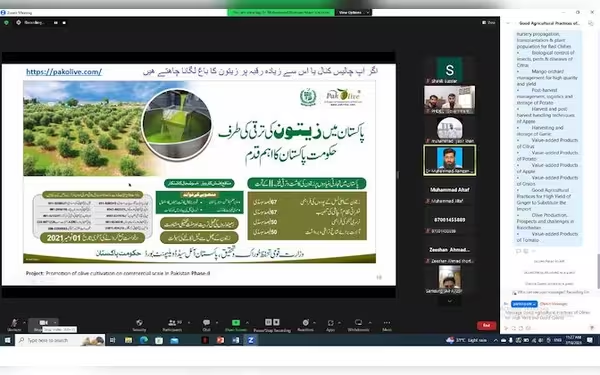Wednesday, July 3, 2024 09:15 PM
PHDEC Webinar Highlights Modern Olive Cultivation Techniques
- Pakistan aims to boost olive oil production to 16,000 tons by 2027
- Dr. Muhammad Ramzan Anser emphasizes modern techniques for increased yields
- Challenges and opportunities discussed in webinar organized by PHDEC
 Image Credits: PHDEC
Image Credits: PHDECPakistan is focusing on enhancing olive oil production through modern techniques, aiming to reach 16,000 tons by 2027. A recent webinar organized by PHDEC discussed challenges, opportunities, and the importance of adopting advanced production methods.
Pakistan is gearing up to enhance its olive oil production by urging growers to embrace modern techniques. Currently, the country produces around 900 tons of table olives annually, solely for domestic consumption. However, with a target of reaching 16,000 tons of olive oil by 2027, experts are emphasizing the need for increased yield per hectare through advanced production technology.
In 2022, Pakistan imported olive oil and its fractions worth US$12.4 million, while its exports of the same totaled US$32,000, showcasing a significant gap between imports and exports. This disparity highlights the immense potential for both meeting national demand and boosting exports.
During a recent webinar organized by the Pakistan Horticulture Development and Export Company (PHDEC), experts discussed the 'Prospects and Opportunities for Sustainable Olive Cultivation in Punjab.' The event aimed to educate olive farmers and key farm workers on best practices for cultivation.
Dr. Muhammad Ramzan Anser, Project Director at the Center of Excellence For Olive Research and Training (CEFORT), shared insights on Pakistan's current olive production landscape and growth trends over the past decade. He emphasized that Punjab's soil is well-suited for olive cultivation, with over 2 million plants already cultivated across more than 10 districts.
Challenges such as the availability of olive saplings, agronomic practices, research gaps, and limited oil extraction facilities were highlighted during the webinar. Dr. Muhammad Ramzan stressed the importance of adopting modern production techniques to boost yields per hectare and announced that CEFORT is providing technical support to private sector entrepreneurs for commercializing olive oil and value-added products in Pakistan.
The webinar saw active participation from growers, processors, exporters, and academia, all lauding PHDEC's efforts in organizing the informative session.













